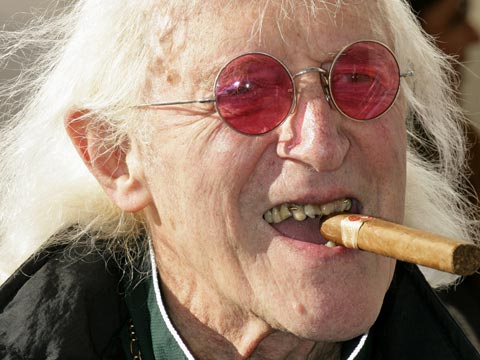You may have noticed a major furore in the press following a programme on ITV in which a former detective, Mark Williams-Thomas, made allegations about the sexual past of Sir Jimmy Savile, a much-loved DJ, TV host and charity fundraiser who died almost a year ago in 2011 at the age of 84. While complaints had been made to the police in 2007 and 08 about Savile’s behaviour, the specific cases were dropped through insufficient evidence – though how hard they looked, who they spoke to and what questions they asked is not on record.
But now Savile is dead, and you can’t libel the dead. Some people abhor the investigation for interfering with the cherished memories of Savile’s shows like Top of the Pops, Clunk-Click and Jim’ll Fix It, though it’s fair to say that there is much shock and indignation about the allegations of paedophilia and grooming young girls, not least from the BBC itself, who have now commenced their own internal inquiry.
Esther Rantzen, grand dame of child protection in her campaigning career and interviewee on the programme, did not want to believe but in the face of the evidence was appalled that she and others tolerated such behaviours and allowed Savile to continue his alleged sexual games unhindered.
But while I mention this case at length, it could be any. This blog is not really about the Savile allegations, though to my mind he would certainly have had a case to answer on the strength of strong evidence of consistent grooming behaviours and a common modus operandi with each of the victims claiming to have been abused. It’s about two related issues:
- The secrecy applied within show business in particular
- The difficulty victims have in coming forward.
Firstly, the conspiracy of silence. In the case of Savile, there are many of his colleagues who claim his behaviour was an “open secret” – they all knew but they did nothing about it. In fact, the BBC claims to be shocked that such behaviour was taking place on their premises and even during shows. The programme identified witnesses who saw it take place, and the victims identified a curtained alcove in which the abuse took place. It was going on while programmes were being recorded, but everybody turned a blind eye. Maybe those people were as much in fear of Savile and his reputation as the victims?
A story doing the rounds is that a newspaper threatened to print the rumours and asked Savile for a comment, to which he replied something to the effect of, “Well, you could print that story, but then the funding for Stoke Mandeville will dry up. Do you want that on your conscience?” And of course the paper did not print. That may or may not be true, but it helps to demonstrate Savile’s keen mind.
But the interesting bit comes later: the journalist who wrote the story was interviewed on the radio. He said the story could not be published, under our draconian libel laws, since the girls themselves did not dare go in the witness box (of which more later), but that Savile approached him with that quote much later. Since the victims would not have told him, the only person who could have done so was a member of staff at the special school used who had been interviewed and who had corroborated some of the details. Never underestimate the Teflon-coated power and radiance of public figures – they command total loyalty and nobody will hear a word said against them.
Over the years, the likelihood is that many of the people we respect for their contributions to our entertainment have engaged in pursuits that they fear would cause great shock, or maybe would simply cause them disgrace and loss of reputation. Crimes of sexual behaviour are one thing, but even preferences were, until very recently, kept from the public domain, and to this day Tom Cruise is suing for millions anyone who claims he is gay, just as Liberace did – in spite of his now renowned lifestyle. Seems to me a very OTT reaction for something that is not even insulting or damaging these days, even if it was at one time the kiss of death to a career.
Another example: it was not until he was fatally ill with AIDS that Rock Hudson’s homosexuality came into the public domain. In his 50s heyday he was a leading man with a rugged, macho image and no hint that his personal preferences might be for guys, but then that would ruin the image and cause a scandal. The studio and all his colleagues kept mum, though they must all have known. Equally, Frankie Howerd’s colleagues kept his sexuality secret until after his death, even at a time when public reaction would have been sympathetic.
But to repeat, these are not crimes and certainly no comparison to instances of child abuse or rape or violence or paedophilia, or whatever offence is rumoured about within any given industry. No doubt many people see and hear things but how many have the courage to take action? Perhaps very few, which might be seen as not pandering to the gossip mongers and keeping yourself to yourself – or breaking the unspoken rules of showbiz by betraying a fellow pro… though many do via kiss & tell memoirs, for example.
Which brings me back to Savile and the power he held over those around him. Witness this quote from one of the BBC articles on this subject:
His 1974 autobiography boasts of having taken home an “attractive” runaway from a remand home before he handed her to the police. As columnist Hugo Rifkind observed in The Times: “It was right out there, in plain view, and nobody wanted to see.”
Many other scandals have not been exposed until after the death of the protagonists, one example that springs to mind being Robert Maxwell and his filching of the Mirror Group pension fund to support his ailing business. He sued for libel anyone who suggested his business was in trouble or that he was engaged in any form of untoward activity, which arguably brings the UK laws of libel into great contempt for enabling any such deception to be kept alive – there was circumstantial evidence to support the claims, but the person with the real evidence was Maxwell himself (and quite possibly two of his sons, though they denied it, of course), and he lied through his teeth. When Maxwell died, under circumstances that are still not fully explained, everyone with evidence published. Court cases followed and the law was changed to prevent these circumstances recurring.
But in business, suing and being sued is almost a daily occurrence. Show business seems to hide a multitude of sins. It is protective of its privacy, demands protection for its fragile prima donnas, resents intrusion except on its own terms. It lusts after a media love-in, where showbiz feeds the stories to reporters and they are printed in exchange for exclusive access. What it doesn’t want is the seedy underbelly of Tinseltown to be raided for the real stories, though it’s not just in Hollywood where there is a grim reality underlying the pizazz.
Talking of egos, one more analogy with Maxwell is desirable. The fact that he was such a domineering bully and overwhelming personality is not accidental. Without that chutzpah you could not get away with maintaining an outward veneer of success and confidence while deliberately engaging in illegal activities. More to the point, the people who do know will not dare tell, and will fear the consequences of so doing. Savile was known to be charismatic, to have connections in all the right places, and to be highly egocentric. As the Americans put it, “do the math”.
But what of the victims themselves? They do say that paedophiles, as Savile may well have been, are devious, manipulative people capable of selecting a victim who may not feel able to speak, but who will not be believed if they do, grooming them, abusing them and dumping them, often traumatising greatly in the process.
So it is easy to understand how people who are victims of sexual crimes like paedophilia and rape, not to mention domestic abuse and violence, and probably other crimes too, can be intimidated and not report their attackers for fear of the consequences – not just fear of physical violence but mental torture, fear of humiliation and worse. People who only saw the good side of Savile and his kind would dismiss such reports out of hand, and to rubbish the words of victims as people with an agenda. If there were one or two vulnerable victims you might think that at least within the realms of possibility, but with hundreds telling very consistent stories independently of one another then the hidden reality is clearly much different – and the power and guile of men like Savile who can suppress such evidence becomes very clear.
If a case comes to court the victim may have to give evidence, be cross-examined and have every aspect of their lives and behaviours dragged through the gutter in the process. These days the victim can at least be protected by screens from seeing the perpetrator of the crimes against them, though in the 70s and 80s the accused could intimidate them even in the courtroom. Not that the perpetrator does not deserve a fair trial, but the whole process must be safe and comfortable for the victim. And at the time, they did not dare go into the witness box.
In Savile’s case, the victims (subject to investigation) were selected from vulnerable groups, including those in institutions who were often invited to join the audience for the maestro’s TV programmes; in other words, they were totally in his domain and without protection of a responsible guardian. Not the most intelligent or eloquent of young women, frequently confused and unable to turn to anybody for help, and those they did were not helpful – they believed the Savile reputation and were bowled over by his fundraising. Those children were vulnerable, as were the boys abused by priests that the Catholic church sheltered for many years – and only reluctantly acknowledged in recent years. The compensation paid could never truly compensate for the lives they ruined, could it?
If the adults in positions of trust and authority don’t believe you, who do you turn to? Not the police, for sure. Is there anywhere these victims can go? It’s easier nowadays with child help lines, reporting on social networking sites and women’s support groups, but at the time there was nothing, nobody with sympathy. Is it any wonder women were silent for so long?
In fact, it looks certain that the police will retrospectively investigate the allegations and interview the witnesses featured in the programme, and indeed many more who have gained the courage to come forward since the programme was broadcast (120 at the time I wrote this article, now potentially as many as 1350!), not least because there is a distinct possibility that other associates of Savile who are still active may be party to the same behaviours – “a paedophile ring.” Politicians are jumping on the bandwagon, and there is even talk of posthumously stripping Savile of his knighthood.
And as for Sir Jimmy, this proves if anything that there is a dark side of every moon, everyone has parts of their lives they never want to be revealed, whatever good they do elsewhere. We should view them in full perspective, good, bad and indifferent. And maybe true perspective can only come after people have died?
Is it right that his reputation is tarnished, possibly for good, regardless of his guilt or innocence? He can’t be tried in a court of law now, though history can deliver some verdicts based on the evidence now coming to light. We can all weigh up the good and bad things we’ve done in life, and most of us would like to think we’ve done far more good than bad. But maybe people who put themselves in the public eye have ways to assuage their own consciences, tell themselves they are not doing harm. That their victims love them for who they are and participate willingly, that it is not abuse but fun all round. And if they do, who takes responsibility for breaking the culture of fear or secrecy?
They said of Hitler that if your lie is big enough nobody will dare disbelieve you. He did it because he could get away with it and because that power was a massive aphrodisiac. It’s we who let him get away with it rather than jailing him for life before he could damage the lives of many more innocent girls.
PS. Jimmy Savile’s headstone is now being removed from his grave to prevent theft or vandalism. The inscription on the bottom reads “it was good while it lasted.” A tad ironic, don’t you think?
PPS. More comments on the Savile case here and here and here.
PPPS. Freddie Starr, accused of assaulting a 14 year old girl, makes an impassioned denial.
PPPS. Many more cases of people coming forward to claim Savile abused them, and more people thinking we should leave Sir Jim and his reputation alone. The BBC are launching enquiries into why the Newsnight programme delving into Savile’s past was abandoned, but tribute shows screened. And most seriously of all, questions being asked into how and why an entertainer like Savile was allowed to make decisions for and about Broadmoor hospital, make ward rounds and do other things the general public would certainly never be entitled to do.
Meanwhile, this article says much about how abusers cover their tracks and stay active so long.








Music started playing anytime I opened this site, so irritating!
My spouse and I absolutely love your blog and find nearly all of your post’s to be just what I’m looking for. Do you offer guest writers to write content available for you? I wouldn’t mind publishing a post or elaborating on a lot of the subjects you write about here. Again, awesome blog!
I think that is one of the so much vital info for me. And i am satisfied studying your article. However wanna observation on few general issues, The web site taste is great, the articles is in reality nice : D. Excellent task, cheers
I am not sure where you are getting your information, but great topic. I needs to spend some time learning more or understanding more. Thanks for fantastic information I was looking for this info for my mission.